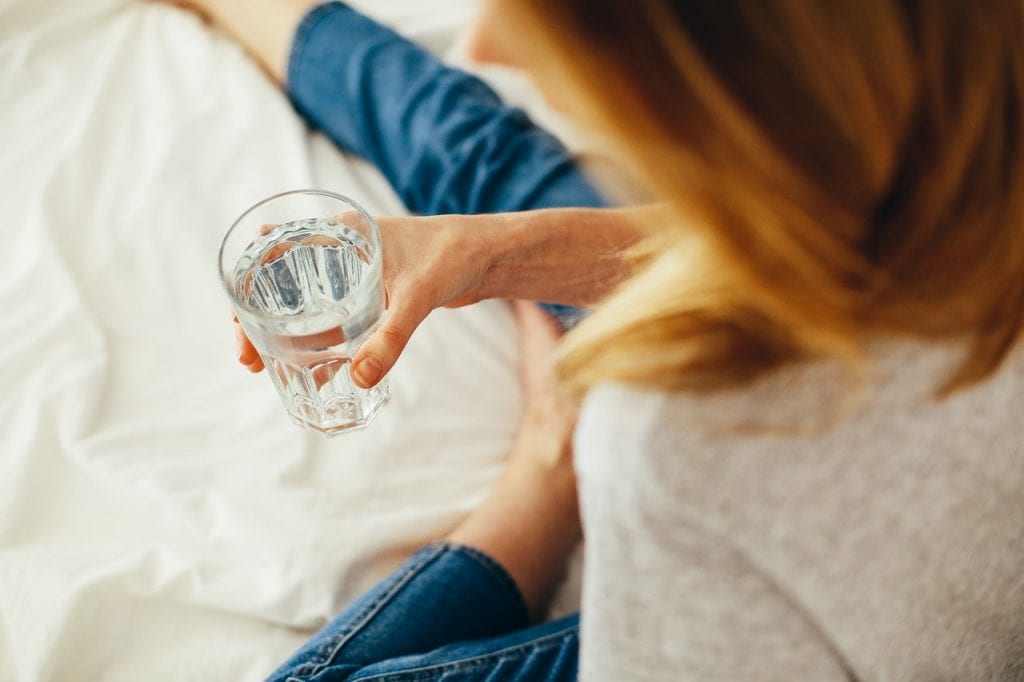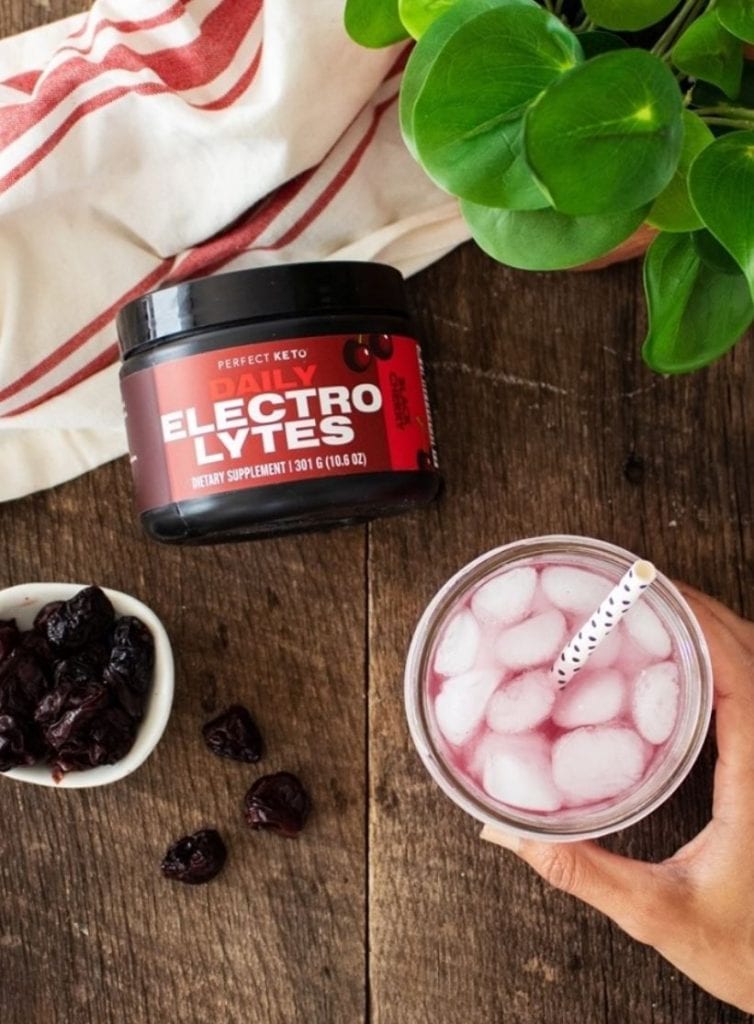Keto headaches are annoying and can affect daily life and productivity; however, it’s 100% normal. Many new dieters experience these headaches, and it goes away within a few days.

But how can you get rid of keto headaches quicker?
Well, this post goes through everything you need to know about keto headaches. I’ll cover what causes them and some quick fixes.
What Causes Keto Headaches?
Keto headaches are the most common keto flu symptoms alongside brain fog and fatigue. But what causes them? Here are some possible causes.
Low Electrolytes
The primary cause of the keto flu on a low carb diet is the lack of electrolytes. This results in symptoms like:
- Headaches
- Fatigue
- Constipation
- Muscle cramps
- Nausea
Low electrolytes cause these symptoms because when you run your body on carbs, you’re carrying 2.7 grams of water per gram of glucose. This stored glucose is like a fluid-filled sponge. Since your body stores electrolytes in fluid, it’s easy to hold onto them.
But when you’re on a keto diet, you deplete glycogen stores and the total volume of water in your body, making it challenging to keep electrolyte levels high.
Dehydration
When adapting to nutritional ketosis, you start urinating more because your body uses up its glycogen and water stores. And if you aren’t drinking extra water to account for this loss, you can experience headaches.
Also, when doing keto, your body produces far less insulin. This is a good thing since it helps you lose weight. However, lower insulin can affect electrolyte levels because insulin absorbs glucose. So your kidneys will produce more sodium when insulin falls, making it easier to get dehydrated.
Low Blood Sugar
Glucose is a form of carbohydrate, and it has been your primary source of fuel for years. When you remove this fuel and swap it out with fat, it puts you in ketosis.
But it takes a while for the body to get efficient at using ketones as a main fuel source. Since it’s depleting glycogen, your blood sugar levels drops, leading to headaches. This is also a significant reason behind brain fog and fatigue.
Withdrawal Symptoms
Many people don’t release how addictive sugar can be. Several studies show sugar is more addictive than hard drugs like cocaine. So if you’ve been eating junk food for years or decades and started doing keto, the headaches you’re experiencing could be sugar withdrawal symptoms.
And even if you weren’t eating table sugar before keto, you can still get these withdrawal symptoms. This is because almost all processed food products contain sugar. This includes:
- Bread
- Pasta
- Cereal
- Ready-made meals
- Low-fat yogurt
You’re experiencing these symptoms due to a feel-good hormone in the brain called dopamine. Because all this junk food has been spiking dopamine, when you remove it, you aren’t triggering as much dopamine anymore, leading to a dopamine deficiency. This causes headaches and other symptoms like brain fog, fatigue, nauseas and even depression.

Vitamin D And Magnesium Deficiency
Studies show patients struggling with migraines are deficient in vitamin D and magnesium.
A 2019 study found vitamin D negatively correlated with the number of headaches you get. So the more vitamin D you consume, the fewer headaches you’ll get.
And if you’re starting keto, you want to up magnesium intake due to increased urination. A medically reviewed 2021 study found magnesium oxide is equally effective at treating migraines as common medications like valproate sodium.
Also, magnesium helps with vitamin D absorption, working together to prevent keto headaches.
An easy way to test if vitamin D and magnesium deficiencies are causing your headaches is to take some supplements. If your headaches immediately get better, you’ll know the lack of vitamin D and magnesium is the problem.
Too Many Carbs And Protein
Limit carb intake to under 30 grams per day on keto. This amount of carbs will promote ketone production and make it easier to get into ketosis. When you’re eating above this amount, you’re consuming too many carbs to produce ketones but too little to supply your brain with the necessary glucose.
This gray area doesn’t give your brain enough glucose or ketones and can leave you with headaches.
But even when your carb intake is in check, if you eat too much protein, your body can convert it into glucose using gluconeogenesis. This interferes with ketosis causing unwanted symptoms like headaches.
Excessive Use Of Sugar Alcohols
Consuming too much sugar alcohol when transitioning to keto may cause headaches since the high glycemic index or GI score spikes blood sugar and affects ketosis. For example, maltodextrin has a GI score of 110.
This can put your body in the gray zone. You aren’t in ketosis, but you’re also low on glucose.
Instead, opt for lower GI sugar alcohols like xylitol, erythritol and monk fruit and use them in small amounts.
Too Many Oxalates In Your Diet
Also known as oxalic acid, oxalates are an anti-nutrient that binds to nutrients like calcium to form crystals that prevent absorption. It’s linked to not only headaches but also kidney stones.
So if you’re eating high-oxalate foods like kale, spinach and almonds, consider reducing or cutting it out of your diet.
Now that we know what causes keto headaches, let’s cover some simple ways to cure them.
How To Avoid And Manage Keto Headaches
These are the most effective ways of dealing with keto headaches.
Be Patient And Drink Lots Of Water
First, you must understand that keto headaches are normal. You could be doing everything right and still get headaches. It’s just your body getting used to ketones as a primary fuel source. Usually, within two to three days, headaches will disappear.
During this period, drink more water. As you adapt to ketosis, you’ll urinate more frequently, losing water. Essential electrolytes are also stored in this water, so you want to replace it to avoid dehydration and deficiencies.
To increase sodium consumption, drink some saltwater and get rid of headaches quicker.

Consume Lots Of Electrolytes
98% of Americans are deficient in potassium. So if you started your keto journey with a potassium deficiency, there’s a high chance your body will lose the little you have during urination.
This is why it’s essential to take electrolyte supplements, especially when you’re starting out.
Brands like Perfect Keto offer high-quality electrolyte powders. You can cover all your potassium, magnesium and sodium needs by simply drinking one scoop in the morning. If you don’t want to get electrolyte supplements, introduce more electrolyte-rich foods into your diet like:
- Fatty fish
- Nuts
- Dark green leafy vegetables
- Bone broth
- Beef
My favorite way of consuming electrolytes is to make bone broth. This works well when you’re on a budget since bones only cost a couple of dollars. You could drink a few cups a day to meet all electrolyte requirements.
Eat Food High In Water
If you feel bloated drinking a lot of water, introduce more foods high in water into your diet. This includes:
- Cucumbers
- Zucchini
- Watermelon
- Lettuce
- Celery
- Cabbage
- Tomatoes
This way, you won’t have to drink large amounts of water, and your body will hold onto electrolytes easier, lessening the effects of keto flu.
For example, if you don’t feel like drinking water, eat some watermelon. It’s 92% water and only has eight grams of carbs per 100 grams. You could also make cocktails with watermelon and cucumbers because it reduces your chance of dehydration when drinking alcohol.
Take Vitamin D Supplements
Vitamin D is more than just a nutrient. It’s a hormone. The body releases it in response to the sun, and it helps with magnesium and calcium absorption. A study found if you take vitamin D and magnesium together, magnesium absorption increases 28 to 39 percent.
Unfortunately, 42% of Americans are vitamin D deficient, so they aren’t even absorbing magnesium to its full potential, resulting in headaches and other keto flu symptoms.
This is where vitamin D supplements can help. If you live in an area with little sunlight, these supplements are necessary. It doesn’t just help with keto headaches; it can:
- Regulate electrolyte imbalances
- Improve mood
- Protect against osteoporosis
Generously Salt Your Foods
Another way to increase electrolyte consumption without supplements is to generously salt your food. Salt isn’t the demon everyone makes it out to be. Several studies show it’s essential to maintain blood pressure, regulate the body’s fluid balance, and avoid migraines.
But a lack of salt can have far more severe health effects than a mere headache. Muscle weakness, cramps and even seizures are all linked to salt deficiencies.
Fortunately, fixing this is easy. Introduce more salt into your diet by generously using the salt shaker. You can even get sodium tablets if you’re looking to increase intake quickly.
Preload Your Body With Electrolytes Before A Night Out
Alcohol makes you urinate more since it’s a diuretic. If you’re starting keto, you’re already losing more water and combined with high alcohol consumption, this can dehydrate you real quick. And when you lose water, you also lose electrolytes, worsening the keto headache.
Electrolytes regulate the body’s fluid volume while helping with muscle contractions and sending nerve signals. So if you preload your body with electrolytes, you’ll lessen the effects of dehydration.
An easy way to do this is to get an electrolyte supplement like Perfect Keto’s Daily Electrolytes and drink it before a night out.
Read our Perfect Keto review.

Avoid Intense Exercise
If you’re experiencing headaches and other keto flu symptoms after removing carbs, avoid intense exercise for a few days. You can always start hitting the gym hard after your keto flu symptoms have cleared.
You want to avoid intense workouts because when you sweat, you lose water and electrolytes. And loss of water and electrolytes is the main reason why keto diets get the dreaded keto flu.
If you want to exercise during this time, stick to brisk walking and other forms of light cardio. This way, you’re exercising without losing liquids.
Take Phenylalanine
If headaches are due to sugar withdrawal, consuming plenty of water and electrolytes won’t do much. Instead, take phenylalanine, a natural amino acid that helps restore dopamine levels back to normal. This lessens sugar withdrawal symptoms like headaches.
You’ll find this amino acid in several keto-friendly foods like:
- Eggs
- Cheese
- Salmon
- Pork
You could also opt for a phenylalanine supplement which is more concentrated and can build up dopamine levels quicker.
There are two forms of phenylalanine. D-phenylalanine and L-phenylalanine. When shopping for this supplement at your local health shop, opt for L-phenylalanine.
D-phenylalanine isn’t really understood since there aren’t many studies covering it. However, it isn’t essential for your body. L-phenylalanine is vital because it builds tyrosine which is responsible for dopamine production.
So if you’re hydrated and your electrolyte levels are high and you’re still getting headaches, take some phenylalanine.
Feel free to read our comprehensive article on does grounding really work?
Final Thoughts On Keto Headaches
Keto flu is a struggle that almost every keto dieter faces. This often involves headaches and fatigue that can affect daily life. However, you can track these symptoms back to dehydration and an electrolyte imbalance.
Ketogenic diet headaches usually last two to three days. During this time, you want to up water and electrolyte consumption.
But if symptoms persist after this three-day mark, it could be due to a vitamin D deficiency, preventing your body from using magnesium and calcium efficiently.
Sugar withdrawals can also cause headaches. If you’re worried, consult your doctor since it’ll give you peace of mind.
Written by
Matt Gaedke
Matt is a former college basketball player turned computer engineer who discovered his passion for health and nutrition after cutting sugar from his diet in 2016. That year he founded KetoConnect with Megha in order to share their ketogenic lifestyle through recipes, videos, and educational content. Matt is always seeking to grow and try new things, a passion he shares with his wife and two amazing sons.

